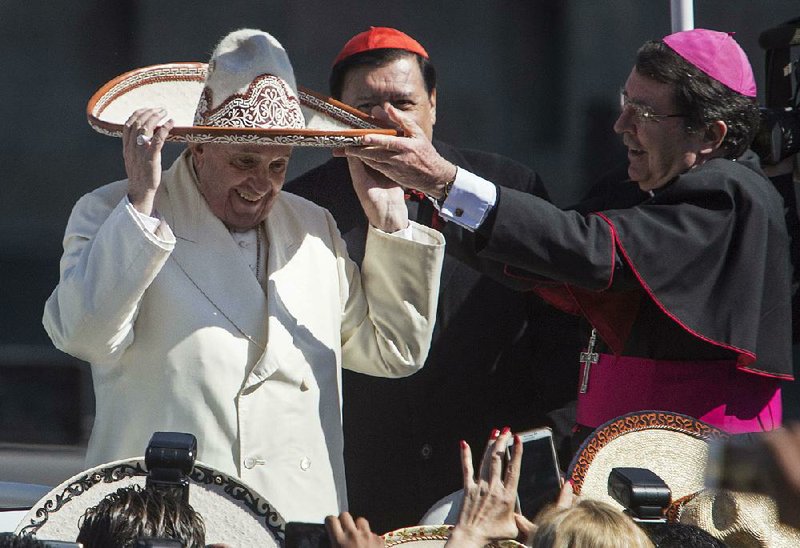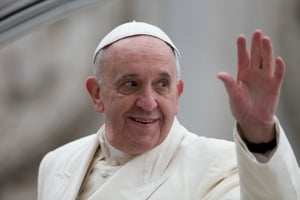MEXICO CITY -- Pope Francis issued a tough-love message to Mexico's political and church elites Saturday, telling them they have a duty to provide their people with security, justice and courageous pastoral care to confront the drug-inspired violence and corruption that are tormenting the country.
Francis was welcomed by cheering Mexicans who lined his motorcade route seven deep.
He criticized how church and state leaders have often failed their people, especially the poorest and most marginalized.
"Experience teaches us that each time we seek the path of privileges or benefits for a few to the detriment of the good of all, sooner or later the life of society becomes a fertile soil for corruption, drug trade, exclusion of different cultures, violence and also human trafficking, kidnapping and death, bringing suffering and slowing down development," he told government authorities at the presidential palace.
In a subsequent speech to his own bishops, Francis challenged church leaders known for their deference to Mexico's wealthy and powerful to denounce the "insidious threat" posed by the drug trade and not hide behind their own privilege and careers.
He told them to be true pastors, close to their people, and to develop a plan to help Mexicans "finally escape the raging waters that drown so many, either victims of the drug trade or those who stand before God with their hands drenched in blood, though with pockets filled with sordid money and their consciences deadened."
On his five-day trip to Mexico, Francis is shining a spotlight on the church's shortcomings and the government's failure to solve social ills that plague many parts of the country.
Over the coming days, Francis is to travel to the crime-ridden Mexico City suburb of Ecatepec, preach to Indians in poverty-stricken Chiapas and offer solidarity with victims of drug violence in Morelia. He also plans a Mass in Ciudad Juarez to pay respects to people who have died trying to illegally cross the border into the United States.
Francis began his first full day in Mexico with a winding ride into the capital's historic center. Tens of thousands of Mexicans enthusiastically greeted him, the first Latin-American pope.
Francis then met with President Enrique Pena Nieto at the presidential palace. He told the president and other members of government that public officials must be honest and upright, and not be seduced by privilege or corruption.
Corruption permeates many aspects of Mexican society, and Pena Nieto's administration has been tainted by what critics call suspect real estate dealings by people close to him, including the first lady.
Francis said political leaders have a "particular duty" to ensure that their people have "indispensable" material and spiritual goods: "adequate housing, dignified employment, food, true justice, effective security, a healthy and peaceful environment."
In his speech, Pena Nieto said he shared Francis' concerns about hunger, inequality and the dangers of people "letting themselves be carried away by evil."
Francis then met with his own bishops at the city's cathedral, issuing a six-page mission statement urging them to be true pastors and not gossiping, career-minded clerics who spew words and inoffensive denunciations that make them sound like "babbling orphans beside a tomb."
Speaking off the cuff, he urged them to maintain unity and show more transparency. "If you have to fight, fight. If you have to say things, say them, but do it like men: to the face," he said.
After Francis met Friday in Havana, Cuba, with the head of the Russian Orthodox Church, Russians from Prime Minister Dmitry Medvedev to ordinary citizens said they see the meeting of the heads of the Roman Catholic and Russian Orthodox churches as significant far beyond religious doctrine.
The pope's meeting in Havana with Patriarch Kirill was the first between the two church's leaders.
Medvedev, speaking Saturday at a security conference in Munich, Germany, said the pope-patriarch meeting could encourage closer relations between Moscow and the West.
"Just yesterday we saw a bright example in the religious area of how the movement of one toward the other is beginning," he said.
Yevgeny Fedorov, a 59-year-old construction worker, held a similar view.
"Maybe this is a small push toward unity, more respect, more correctness in our relations," he said outside Moscow's Christ the Savior Cathedral, one of the city's most prominent Orthodox sites. But, he added, ""I don't think the West will begin to respect us tomorrow because of the meeting."
Information for this article was contributed by Peter Orsi, Carlos Rodriguez, Eduardo Castillo, Juan Zamorano, Jacobo Garcia, Jim Heintz, Alexander Roslyakov, Colleen Barry, and Jovana Gec of The Associated Press.
A Section on 02/14/2016

